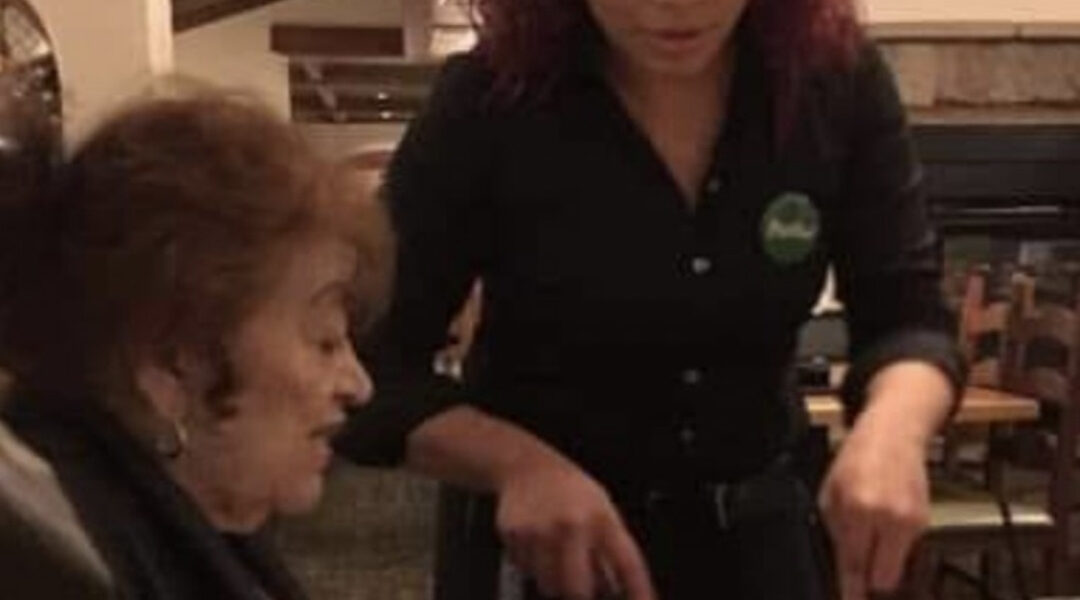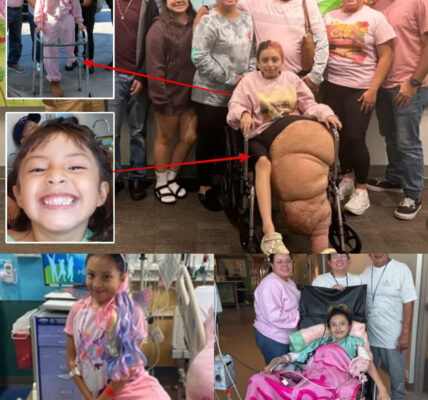
The restaurant buzzed softly with the familiar hum of dinner rush — the clatter of dishes, the gentle murmur of families gathered around warm plates of food. It was an ordinary evening at Olive Garden, one of those simple family dinners meant to bring a little light to the week.
At one corner table sat a family of three — a daughter, her teenage son, and her 79-year-old mother. The elderly woman had chosen a seat near the end of the table, where she could stretch her legs and move easily if she needed to. It was a small thing, a quiet preference born of age and comfort, but it mattered to her.
They placed their orders, exchanged stories, and laughed between sips of iced tea. It was the kind of dinner you might forget a week later — until something happened that made sure they never would.
When the food arrived, the daughter turned to check on her mother, expecting to see her carefully cutting her steak into small pieces the way she always did. But instead, she froze.
Standing beside her mother was their server — a young woman named Susie — knife and fork in hand, gently cutting the steak into neat, bite-sized pieces.
For a moment, the daughter couldn’t process what she was seeing. This wasn’t part of anyone’s job description. It wasn’t asked for or expected. Yet there Susie stood, her focus entirely on the elderly woman beside her.
“Is this okay for you, sweetheart?” she asked softly. “Let me cut this one a little smaller.”
Her tone was patient and kind — the kind of kindness that feels personal. She didn’t rush, didn’t seem in a hurry to move on to her next table. For nearly three minutes, she stood there, carefully slicing each piece, making sure the older woman could eat comfortably.
The mother smiled the entire time, glancing now and then at her daughter with eyes that sparkled like a child being gently cared for. The daughter smiled back, feeling a lump rise in her throat.
It wasn’t just the act itself — it was the heart behind it.
When Susie finished, she set the knife down, gave the woman’s shoulder a gentle pat, and said, “There we go. I don’t mind — I have grandparents, and I know how it is sometimes.”
And just like that, she walked away — no fanfare, no expectation of thanks — just quiet humility.
But the daughter couldn’t let it go unnoticed. After dinner, she found the manager and told him everything. Her voice wavered as she spoke, emotions spilling over. “I need you to know what your employee did,” she said. “My mother is 79 years old. She’s independent, proud — but tonight, someone treated her with gentleness, with dignity. You can’t teach that. That kind of heart isn’t trained — it’s who she is.”
The manager listened, visibly moved, promising that Susie would be recognized for her act of kindness.
As the family left the restaurant, the daughter noticed her mother still smiling, her eyes brighter than they’d been in weeks. “She was so sweet,” the older woman said quietly. “People like her make the world feel softer.”
The daughter nodded, her throat tight. Because she knew her mother was right — it’s not the grand gestures that restore faith in humanity. It’s moments like this: a stranger kneeling beside a table, taking time to make someone’s life a little easier, a little kinder.
That night, as she sat in her car, the daughter thought about how the world often celebrates the loudest acts — the biggest donations, the boldest headlines. But maybe what really changes the world are the quiet things. A plate of food cut with care. A smile shared across a table. A server who saw more than a customer — she saw a person.
And maybe that’s what kindness truly is — not a performance, but a reflex of the heart.
Susie probably went home that night thinking nothing of it. But to one family — and to one grateful daughter — she reminded them that compassion still exists, even in the most ordinary places.
Because sometimes the greatest service isn’t what’s written on a receipt.
It’s what’s written on someone’s heart.




